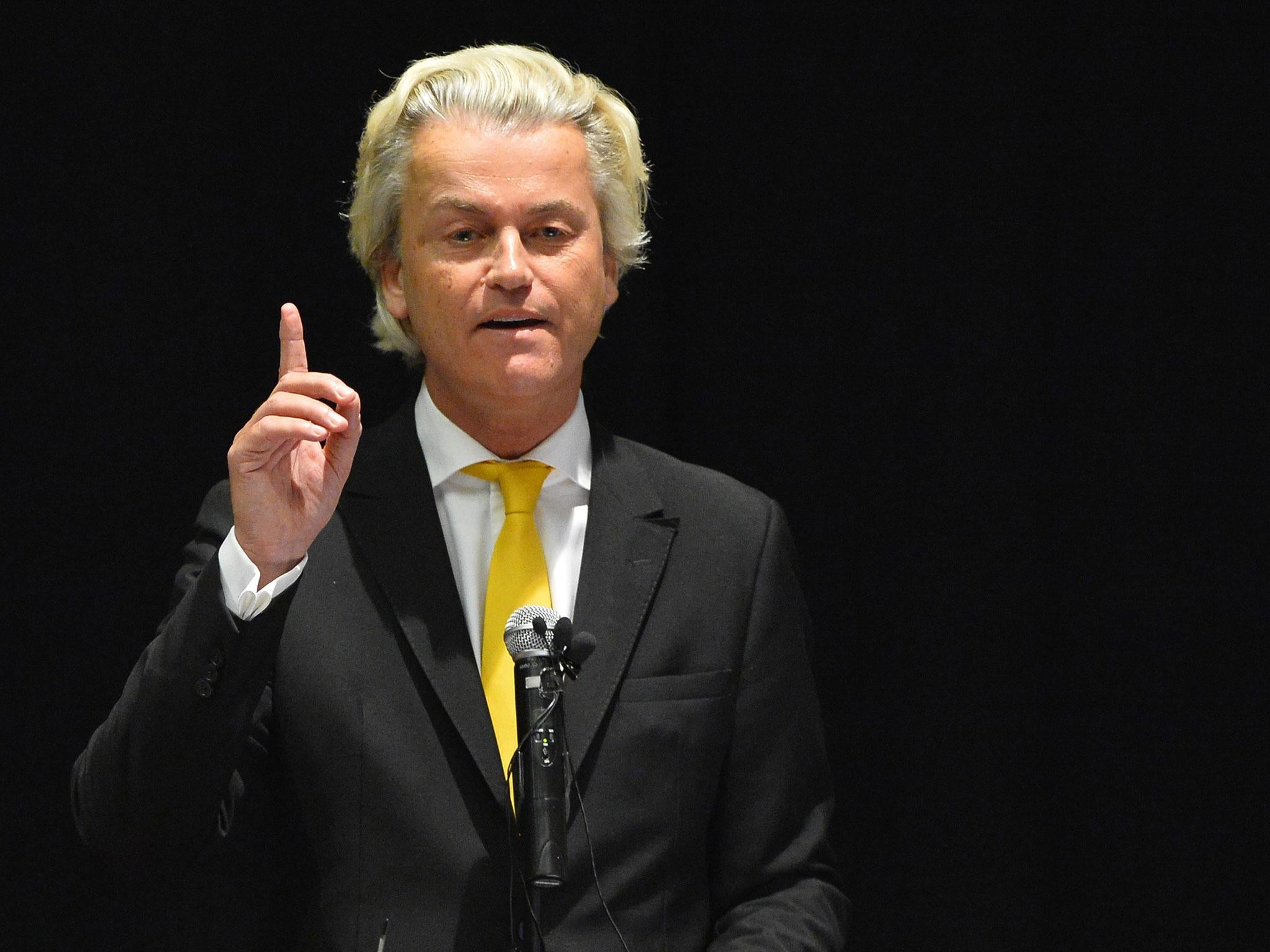Geert Wilders: The far-right Dutch politician making a career out of discriminating against immigrants
Wilders was once banned from entering the UK because of his extreme views on Islam and immigration

Your support helps us to tell the story
From reproductive rights to climate change to Big Tech, The Independent is on the ground when the story is developing. Whether it's investigating the financials of Elon Musk's pro-Trump PAC or producing our latest documentary, 'The A Word', which shines a light on the American women fighting for reproductive rights, we know how important it is to parse out the facts from the messaging.
At such a critical moment in US history, we need reporters on the ground. Your donation allows us to keep sending journalists to speak to both sides of the story.
The Independent is trusted by Americans across the entire political spectrum. And unlike many other quality news outlets, we choose not to lock Americans out of our reporting and analysis with paywalls. We believe quality journalism should be available to everyone, paid for by those who can afford it.
Your support makes all the difference.His party is leading the polls in the Netherlands and he has now been found guilty of inciting discrimination against immigrants in a hate speech trial, but who exactly is Geert Wilders and does he have a chance of winning?
This month’s trial is not the first time Wilders’ pronouncements on the subject of Islam have landed him in the dock.
A Dutch court acquitted him of charges of hate speech in 2011 after he compared the Quran to Hitler’s Mein Kampf and called for a “towel-head” tax on Muslim women who wear the veil – comments the judged deemed “rude and denigrating” but “on the edge of what is allowed”.
Wilders called that acquittal “a victory for freedom of expression in the Netherlands”. His willingness to flaunt supposed political correctness is at the core of his appeal. Like many populist leaders across Europe, he succeeds in painting himself as an outsider.
In a statement before his recent trial, he described himself as “a politician who says what the politically correct elite do not want to hear”.
His unvarnished remarks on immigration have won him much support and if polls are to be believed, his party would come out of the elections in March as the largest single party with a strong moral case for attempting to form a government.
Born in the Dutch city of Venlo, the youngest of four children, Wilders’ political career began as a speechwriter for People’s Party for Freedom and Democracy (VVD) before he became a member of the House of Representatives in 1998.
The key juncture, however, came in 2004 when Wilders renounced his party affiliation over its openness to Turkish membership of the European Union.
Wilders kept his seat and sat in Dutch parliament as a one-man party called Groep Wilders (Wilders’ Group) before founding the Party for Freedom (PVV) in 2006.
Its most recent manifesto, published in August, promised to ban all mosques and migrants from Islamic countries.
Islam featured heavily in the 11-point plan, which promised to root out elements of other faiths that were “contrary to the country’s order”.
In 2008, a short film called Fitna made by Wilders, which presented Islam as an inherently violent religion caused international outcry. He was due to show the film in the British House of Lords in 2009 when the then Home Secretary issued a statement saying Wilders would be refused entry to the UK should he attempt to enter.
The decision was overturned on appeal later that year and Wilders was invited back again to show his film in January 2010 by Lord Pearson, a UKIP peer, and cross-bencher Baroness Cox.
In a press conference afterwards he described the Prophet Muhammad as barbarian, a mass murderer and a paedophile, once again causing outrage.
As well as being anti-immigration, Wilders and the PVV are fierce opponents of the European Union.
He was one of the most prominent figures in the ‘No’ campaign for a referendum on the European Constitution in 2005, when 62 per cent of Dutch voters rejected the treaty in a precursor of today’s anti-European sentiment.
After the result Wilders described himself as “incredibly happy that the Dutch voter has rubbed it in the faces of the political elite in The Hague and Brussels”.
Since then he has attempted to align himself with the French National Front and its leader, Marine Le Pen, in the European Parliament. However, an attempt to form a parliamentary grouping alongside right-wing parties from Italy and Belgium to slay “the monster in Brussels” foundered.
After the vote for Brexit, Wilders was quick to propose that the Dutch should hold a referendum on their membership of the European Union.
And he has promised to hold one if he becomes Prime Minister.
Join our commenting forum
Join thought-provoking conversations, follow other Independent readers and see their replies
Comments